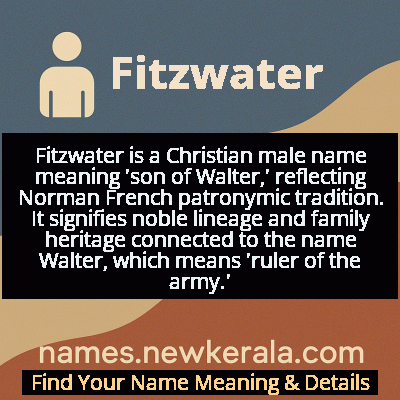Fitzwater Name Meaning & Details
Origin, Popularity, Numerology Analysis & Name Meaning of Fitzwater
Discover the origin, meaning, and cultural significance of the name FITZWATER. Delve into its historical roots and explore the lasting impact it has had on communities and traditions.
Name
Fitzwater
Gender
Male
Origin
Christian
Lucky Number
2
Meaning of the Name - Fitzwater
Fitzwater is a Christian male name meaning 'son of Walter,' reflecting Norman French patronymic tradition. It signifies noble lineage and family heritage connected to the name Walter, which means 'ruler of the army.'
Fitzwater - Complete Numerology Analysis
Your Numerology Number
Based on Pythagorean Numerology System
Ruling Planet
Moon
Positive Nature
Diplomatic, friendly, artistic, empathetic.
Negative Traits
Over-sensitive, moody, indecisive, prone to self-pity.
Lucky Colours
Green, cream, white.
Lucky Days
Monday.
Lucky Stones
Pearl, moonstone.
Harmony Numbers
1, 3, 4.
Best Suited Professions
Diplomats, mediators, caregivers, artists.
What People Like About You
Cooperative spirit, friendliness, artistic talent.
Famous People Named Fitzwater
Robert Fitzwater
Medieval Nobleman
Prominent Norman noble who served under King Henry I of England
John Fitzwater
Military Commander
Fought in the Hundred Years' War and served as Sheriff of multiple English counties
Thomas Fitzwater
Colonial Settler
Early Quaker settler in Pennsylvania who established one of the first mills in the colony
William Fitzwater
Religious Leader
Abbot of St. Albans Abbey who oversaw significant monastic reforms
Name Variations & International Equivalents
Click on blue names to explore their detailed meanings. Gray names with will be available soon.
Cultural & Historical Significance
The cultural significance extends beyond medieval England to the diaspora of Norman descendants throughout the English-speaking world. As families bearing the Fitzwater name migrated to North America, Australia, and other regions, they carried with them this connection to Norman heritage and aristocratic tradition. In modern genealogy and family history research, the name serves as a marker of specific historical migration patterns and social standing. The preservation of such patronymic names reflects ongoing cultural values around family identity and historical continuity, even as the original Norman-French language and specific feudal structures that gave rise to the name have faded from common usage.
Extended Personality Analysis
Individuals bearing the Fitzwater name are often associated with characteristics of leadership, tradition, and resilience. Historically linked to Norman aristocracy, the name suggests a personality that values heritage and duty, often displaying natural authority and organizational skills. These individuals tend to be practical problem-solvers who approach challenges with methodical determination, reflecting the military origins of the name's root 'Walter' meaning 'army ruler.' They typically exhibit strong family loyalty and a sense of responsibility toward their community, traits that would have been essential for medieval nobles managing estates and leading local populations. The name also implies a certain dignity and reserve, combined with pragmatic intelligence that enables effective decision-making in complex situations.
Beyond these foundational traits, Fitzwaters are often perceived as having a strong sense of justice and fairness, likely stemming from the historical role of Norman nobles as local administrators and arbiters. They tend to be reliable and consistent, with a deep respect for established systems and procedures while also possessing the flexibility to adapt when necessary. The combination of traditional values with practical adaptability makes them effective in roles requiring both historical perspective and contemporary relevance. Their connection to water in the name's etymology (through Walter) may symbolically suggest emotional depth and fluid thinking, allowing them to navigate complex social and professional waters with grace and effectiveness. This balance of strength and flexibility, tradition and innovation, creates a personality profile that is both grounded and capable of significant achievement.
Modern Usage & Popularity
In contemporary times, Fitzwater is primarily used as a surname rather than a given name, though it occasionally appears as a distinctive first name in families with strong Norman or English heritage. The name maintains a presence in genealogical circles and among descendants of Norman families who settled in England and later migrated to North America, Australia, and other English-speaking regions. While not common in modern naming trends, Fitzwater carries an air of historical distinction and aristocratic connection that appeals to parents seeking unique names with deep historical roots. Its usage has remained relatively stable but rare, with occasional appearances in professional contexts, particularly in law, academia, and historical preservation where the name's heritage adds credibility and connection to tradition. The name's rarity in modern usage contributes to its distinctive character, making it memorable while maintaining its historical gravitas.
Symbolic & Spiritual Meanings
Symbolically, Fitzwater represents lineage, heritage, and the transmission of family identity through generations. The name embodies the concept of paternal legacy and the continuity of family traditions across centuries. As a patronymic, it symbolizes the connection between past and present, serving as a living link to ancestral roots and historical identity. The 'Fitz' element specifically symbolizes noble birth and aristocratic privilege in medieval European society, while the 'water' component (from Walter) carries connotations of leadership, strength, and military prowess. Together, these elements create a symbolic representation of established authority, family pride, and historical continuity. The name also symbolizes adaptation and survival, having transitioned from its original Norman context to become part of the broader English-speaking world's cultural tapestry, representing the enduring power of family identity across time and geographical boundaries.

